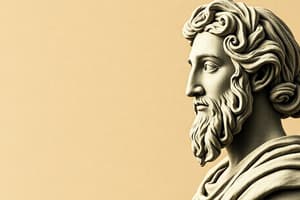Podcast
Questions and Answers
What does Kant believe about the perceptions that individuals have of their surroundings?
What does Kant believe about the perceptions that individuals have of their surroundings?
- They are influenced solely by emotional responses.
- They are organized by the human mind.
- They stem from inherited knowledge.
- They are randomly infused without an organizing principle. (correct)
How does Merleau-Ponty describe the relationship between the mind and the body?
How does Merleau-Ponty describe the relationship between the mind and the body?
- The mind governs the body entirely.
- The body is merely a vessel for the mind.
- They are completely separate entities.
- They are intertwined and cannot be separated. (correct)
According to Gilbert Ryle, what is essential in understanding a person's identity?
According to Gilbert Ryle, what is essential in understanding a person's identity?
- The intrinsic traits they are born with.
- The thoughts they keep private.
- The behaviors they exhibit in daily life. (correct)
- Their capacity for emotional intelligence.
What does the notion of embodied experience suggest according to Merleau-Ponty?
What does the notion of embodied experience suggest according to Merleau-Ponty?
What concept does Kant challenge regarding the acquisition of knowledge?
What concept does Kant challenge regarding the acquisition of knowledge?
What is the fundamental nature that the philosophy focuses on?
What is the fundamental nature that the philosophy focuses on?
Which philosopher is known for the concept of the unexamined life?
Which philosopher is known for the concept of the unexamined life?
What are the three components of the soul according to Plato?
What are the three components of the soul according to Plato?
What does Augustine believe about the nature of man?
What does Augustine believe about the nature of man?
According to Thomas Aquinas, what are the two parts man is composed of?
According to Thomas Aquinas, what are the two parts man is composed of?
What is the goal of every human person according to Augustine?
What is the goal of every human person according to Augustine?
In Plato's view, what is necessary for justice in a human person?
In Plato's view, what is necessary for justice in a human person?
What does matter refer to in Thomas Aquinas' philosophy?
What does matter refer to in Thomas Aquinas' philosophy?
What distinguishes a human person from an animal, according to Thomas Aquinas?
What distinguishes a human person from an animal, according to Thomas Aquinas?
Which concept is central to René Descartes' philosophy regarding the self?
Which concept is central to René Descartes' philosophy regarding the self?
How does David Hume describe the self?
How does David Hume describe the self?
What is the significance of the phrase 'Cogito, ergo sum' in Descartes' philosophy?
What is the significance of the phrase 'Cogito, ergo sum' in Descartes' philosophy?
According to Hume, how do individuals attain knowledge?
According to Hume, how do individuals attain knowledge?
What is the 'cogito' in Descartes' philosophy?
What is the 'cogito' in Descartes' philosophy?
How does Aquinas view the relationship between the body and the soul?
How does Aquinas view the relationship between the body and the soul?
In what way does Hume's view of the self differ from those of his predecessors?
In what way does Hume's view of the self differ from those of his predecessors?
Flashcards are hidden until you start studying
Study Notes
Learning Objectives
- Students should understand various philosophical perspectives on the self and its dimensions.
Philosophy
- Explores the fundamental nature of the self.
Socrates
- First philosopher to engage in systematic self-questioning.
- Asserted that knowing oneself is essential to philosophy.
- Believed an unexamined life is not worth living.
- Proposed that every individual consists of both body and soul, with the body being imperfect and the soul being perfect.
Plato
- Argued for the dual nature of humans: body and soul.
- Identified three components of the soul: rational, spirited, and appetitive.
- In "The Republic," emphasized that justice within a person requires harmony among the three parts of the soul.
Augustine
- Agreed with the bifurcation of human nature.
- Posited that the body is destined to die, while the soul seeks eternal life in spiritual bliss with God.
- Asserted that the goal of life is to achieve communion with the divine through virtuous living.
Thomas Aquinas
- Doctor of the Church and prominent medieval philosopher.
- Claimed humans consist of matter and form:
- Matter: Physical substances that compose everything.
- Form: The essence of a substance, distinguishing it from others.
- The human body shares characteristics with animals, but the soul defines human essence.
René Descartes
- Known as the father of modern philosophy.
- Proposed a dualistic view of the human person: body and mind.
- Suggested that much of our beliefs might be false; however, the existence of the self cannot be doubted.
- Coined the phrase "Cogito, ergo sum" (I think, therefore I am), emphasizing self-awareness and existence.
- The self comprises two distinct entities: the thinking mind (cogito) and the physical body (extension).
David Hume
- Believed knowledge is derived from sensory experience.
- Suggested that the self is not a separate entity but rather a collection of impressions.
- Defined the self as a bundle of perceptions that constantly change and interact.
Emmanuel Kant
- Argued that perceptions come randomly without an inherent organizing principle.
- Suggested that the self comprises knowledge acquisition rather than a fixed entity that defines personality.
Gilbert Ryle
- Emphasized that behavior is what truly matters in identifying the self.
- Proposed that the self is not a locatable entity but rather a convenient label for behaviors exhibited by individuals.
Maurice Merleau-Ponty
- Claimed that mind and body are intertwined and inseparable.
- Asserted that all experiences are embodied, with one's body serving as a conduit to existence in the world.
Studying That Suits You
Use AI to generate personalized quizzes and flashcards to suit your learning preferences.



